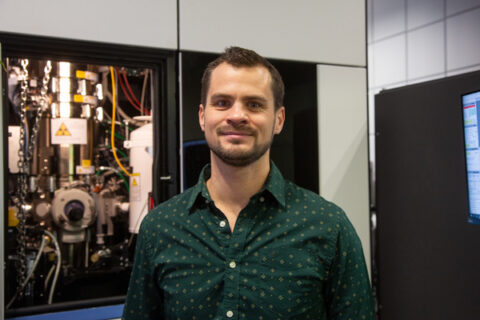ERC Starting Grant for Prof. Dr. Philipp Pelz
Philipp Pelz receives European funding
Prof. Dr. Philipp Pelz has been awarded the ERC Starting Grant for his work on improving imaging methods in materials science. The aim of his work is to optimize the imaging and analysis methods of electron microscopy in order to learn more about the structure of materials on the atomic scale. The ERC Starting Grant is endowed with up to 2.5 million euros and covers a funding period of five years.
Hopes to lift the curtain on the mysteries of radiation-sensitive materials
“The ability to view the atomic level and at the same time discover all there is to know about the involved elements is a dream for material scientists,” says Philipp Pelz. The professor of Computational Materials Microscopy at FAU hopes to get a little bit closer to this dream with his ERC-funded project HyperScaleEM, in which he is developing methods for high-volume atomic 3D imaging using electron microscopes. His research covers three different areas. First, very light elements, such as hydrogen and oxygen, which are barely detectable using more traditional methods. Second, alloys that are difficult to characterize due to the fact that the included elements have a similar contrast and are therefore difficult to tell apart. And third, nano and quantum electronics,” explains Pelz. “Here, structures are so small that the three dimensional positions and bonds between the individual atoms play a major role. I hope to make this visible.”
His approach involves optimizing both technology and imaging algorithms. “Thanks to the funding, I can purchase the optimal equipment, for example a spectrometer,” Philip Pelz explains. “In addition, we are also working with cameras that are capable of directly filming electrons without having to take the more roundabout approach of using light signals.” At the same time, Pelz is conducting research into computer-assisted imaging and analysis methods. His research is based on the latest findings in machine learning. “Electron microscopes deliver a wide range of imaging channels. We hope to extract as much information as possible from the data by correlating these channels with each other. As a result, electron microscopes should become more autonomous and deliver three dimensional images of complex samples in atomic resolution.”
The ERC project offers Philipp Pelz the ideal opportunity to connect his academic interests. He focused on electron microscopy during his doctoral degree, after studying physics and computer science in Munich. “For me it is the perfect combination: I need a knowledge of physics to understand how the microscope collects data and computer science to gain information from the data.” By choosing to research in Erlangen, Pelz is also returning home: he grew up in Nuremberg and completed his Abitur at the Melanchthon Gymnasium in the city.
Philipp Pelz studied computer science and applied physics at TU München, chemistry at Montpellier (France) and material sciences at the University of Turin In 2018, he completed his doctoral degree at the Max Planck Institute for the Structure and Dynamics of Matter in Hamburg on computer imaging and electron microscopy. From 2019 until 2022 he was a postdoctoral researcher at the Department of Materials Science & Engineering at the University of California, Berkeley (USA). Since 2022, Pelz has been professor of Computational Materials Microscopy at FAU.
Contact
Prof. Dr. Philipp Pelz
Department of Materials Science and Engineering, Institute of Micro- and Nanostructure Research
philipp.pelz@fau.de
